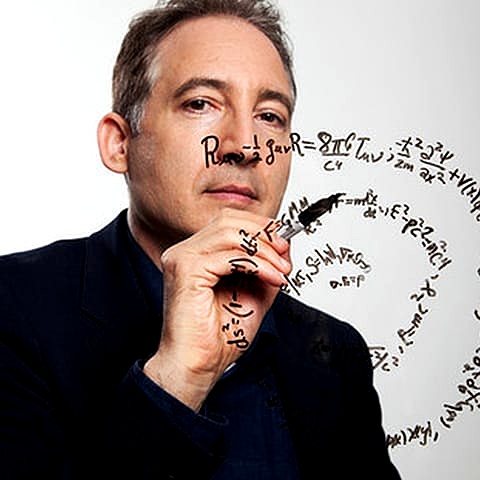Brian Greene's Book Recommendations
Brian Greene is an American theoretical physicist and author, best known for his work on string theory and popularizing science through his books and media appearances. Greene’s books, including The Elegant Universe and The Fabric of the Cosmos, have helped bring complex concepts in physics to a general audience. He is also the co-founder of the World Science Festival, which promotes public engagement with scientific topics. Greene’s research and ability to communicate scientific ideas have made him one of the most influential figures in theoretical physics. His work continues to inspire curiosity about the universe and our understanding of it.

Start Listening to Book Summary
Books in the Collection
Showing 8 of 12 books in this collection
Book Summaries
The Power of Myth Book Summary
In 'The Power of Myth,' Joseph Campbell explores the universal themes and archetypes found in myths across cultures and time. He discusses how these stories shape our understanding of life, death, and identity. Through captivating dialogues with Bill Moyers, Campbell reveals the relevance of these ancient narratives to contemporary society. This book invites readers to reflect on their personal journeys while uncovering the profound connections that bind humanity together. Discover how embracing myths can empower and inspire your own life story.
The Big Picture Book Summary
In 'The Big Picture', physicist Sean Carroll invites readers to explore the fascinating intersections of science, philosophy, and the meaning of life. He delves into the fundamental nature of reality, presenting complex concepts in a captivating and accessible manner. With a blend of narratives and profound insights, Carroll challenges us to consider our place in the universe. As he unravels the mysteries of existence, readers are urged to reflect on the implications of science for understanding consciousness and our everyday experiences. This thought-provoking journey leaves us questioning: what does it truly mean to be human in a cosmos governed by natural laws?
An Appetite for Wonder Book Summary
In 'An Appetite for Wonder', Richard Dawkins takes readers on a captivating exploration of his life and the origins of his scientific passions. This memoir blends personal anecdotes with profound insights into evolutionary biology, highlighting the awe and wonder of the natural world. Dawkins shares his reflections on pivotal experiences that shaped his thinking and his fight against superstition and dogma. With eloquence and clarity, he invites readers to embrace curiosity and skepticism as essential tools for understanding our universe. This is not just a biography; it’s a call to marvel at the complexity of life and our place within it.
The Ascent of Man Book Summary
In 'The Ascent of Man,' Jacob Bronowski takes readers on an intellectual journey that explores the intertwined evolution of humanity and science. Through vivid historical anecdotes and philosophical insights, he examines how human creativity has shaped the world. The book captures key moments in science, art, and culture, showcasing our capacity for innovation and understanding. Bronowski challenges us to reflect on our achievements and responsibilities as a species. This thought-provoking narrative leaves readers questioning what lies ahead in our ascent.
Tractatus Logico-Philosophicus Book Summary
In 'Tractatus Logico-Philosophicus,' Ludwig Wittgenstein explores the relationship between language, reality, and thought, proposing that the structure of language reflects the structure of the world. The book is a profound investigation into the limits of language, suggesting that many philosophical problems arise from misunderstandings of language use. Wittgenstein's unique notation and concise propositions challenge readers to rethink their understanding of meaning and reference. As the study culminates in the idea that "whereof one cannot speak, thereof one must be silent," it beckons readers to explore the often inexpressible truths of existence. This enigmatic work leaves lingering questions about the nature of reality and the capacity of language to convey it.
The Hero with a Thousand Faces Book Summary
In "The Hero with a Thousand Faces," Joseph Campbell explores the universal patterns of myth and storytelling that shape human experience. He introduces the concept of the "monomyth," a heroic journey shared across cultures, where heroes encounter trials, self-discovery, and transformation. Through captivating examples from diverse myths, Campbell reveals how these narratives resonate deeply within us, unlocking insights about our own lives. As he decodes the significance of archetypes, the reader is invited to reflect on their own personal journey. Discover why this groundbreaking work has inspired countless writers, filmmakers, and thinkers to weave their own tales of adventure and triumph!
The Denial of Death Book Summary
In 'The Denial of Death,' Ernest Becker explores the profound human fear of mortality and the ways people cope with this existential dread. Through a blend of psychology, philosophy, and anthropology, he argues that much of human behavior is motivated by the desire to transcend death, leading to cultural and personal constructs that deny our mortality. The book challenges readers to confront the reality of death and rethink their values in the face of impermanence. Becker's insights reveal how our denial shapes society and individual lives, urging a deeper understanding of what it means to live authentically. This thought-provoking masterpiece invites readers to grapple with the ultimate questions of existence: how to live and die meaningfully.
The Man Who Mistook His Wife For A Hat: And Other Clinical Tales Book Summary
In 'The Man Who Mistook His Wife For A Hat,' renowned neurologist Oliver Sacks delves into the intricate worlds of his patients, each with unique and perplexing neurological disorders. Through a series of captivating clinical tales, he explores the profound connection between mind and behavior, unveiling the mysteries of the human brain. The titular case of the man who mistakes his wife for a hat highlights the surreal experiences of those affected by cognitive dysfunction. Sacks invites readers to ponder the nature of identity and perception, raising questions about what it means to be truly human. This thought-provoking work is both a compelling exploration of neurology and a celebration of the resilience of the human spirit.

















